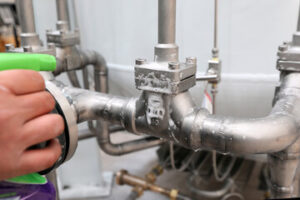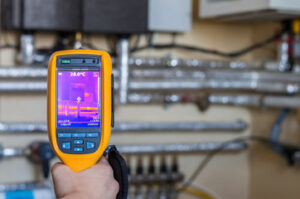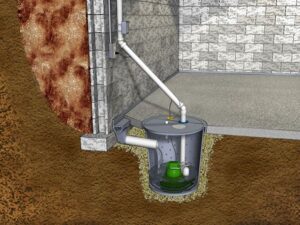Westminster Plumber designs, builds, and repairs piping systems that transport water, sewage, and heating systems. These systems are vital to modern living, providing clean water and ensuring waste is safely eliminated.

Visually inspect all visible pipes and fixtures for leaks, damage, or improper installation. Check drain lines for slow drainage or gurgling noises that indicate blockages or venting issues.
Plumbers are in demand, as issues with water and plumbing systems occur frequently in homes, offices, hospitals and other buildings. This consistent demand provides stability and job security for qualified plumbers. Plumbers can also choose to become self-employed, allowing them to set their own hours and rate of pay. They can find work through construction companies, join trade unions or begin their own plumbing businesses. Plumbers who specialize in areas such as green plumbing or backflow prevention can also earn higher salaries.
The physical demands of this career can be challenging for some. The work requires frequent lifting of heavy equipment and tools, as well as the ability to crawl in tight spaces, all of which can strain muscles and joints. Additionally, plumbers may be exposed to hazardous materials and chemicals, such as sewage, that require special training and protective equipment to handle.
Emergency calls can disrupt personal and family life, as plumbers must be available for call-outs at any time. This can lead to overtime, which can affect work-life balance. Plumbers should also be prepared to work in a variety of weather conditions, including extreme heat and cold, as outdoor work is sometimes required.
As a skilled professional, plumbers are expected to keep up with industry trends and best practices, which can require continuing education and certification. In addition, many states require licensed plumbers to comply with certain regulatory standards. These requirements vary by state, so it is important for plumbers to be aware of the requirements in their area.
Plumbers who wish to advance in their careers can consider becoming a supervisor or a foreman. These positions require greater levels of responsibility, as well as the ability to oversee Plumbers, Trades Helpers and Apprentices. Plumbers who supervise or work as a foreman are responsible for the planning, coordination and execution of more complicated and specialized plumbing maintenance, installation and repair operations. These positions often require independent judgment in assigning duties and selecting the most appropriate plumbing methods to meet project needs. They are also responsible for scheduling and procurement of materials.
Job Duties
The job duties of a plumber involve the inspection, installation, repair and maintenance of plumbing systems. The skills required for this profession include a high school diploma, physical stamina, and the ability to use hand and power tools. Plumbers must also be knowledgeable of construction standards and plumbing codes.
In addition to repairing and installing sinks, toilets, faucets, showers and water heaters, plumbers may install gas lines and other related equipment. They may be called on to make emergency repairs when a building is under construction or after a natural disaster. Some plumbers work on plumbing systems in hospitals, schools, office buildings and other commercial structures.
Plumbers are also involved in designing piping that disperses water, removes waste and connects heating and cooling systems. They must be able to read and interpret blueprints and other diagrams and must have good customer service skills when meeting with clients.
Some plumbers are self-employed and work independently from a company, while others may be employed by a plumbing supply house or by an engineering firm. In these positions, the plumber may be responsible for directing other employees and helping to design new building projects. The employer may require that the plumber maintain a valid plumbing contractor license and other applicable certifications.
Plumbers may be asked to test the water pressure in a home or business, and inspect all aspects of a plumbing system. The inspector will check for signs of rust or other contaminants in the water, as well as how efficiently the system is working. The plumber will look at the water heater for signs of leaks or improper operation, and will also examine the drain lines to ensure there are no cracks or clogs.
In some instances, a plumber may be asked to perform a special task such as opening a clogged drain or fixture with a pressurized plunger. This type of task usually requires a certain amount of physical strength and dexterity, along with the ability to climb ladders and other tall structures. Plumbers often work with dangerous chemicals and sewage, so it is important that they take all necessary safety precautions when performing their job duties.
Education and Training Requirements
Unlike some careers that require years of schooling and student debt, becoming a plumber only requires a high school diploma or equivalent. The next step is to enroll in a vocational program or apprenticeship, which provides on-the-job training while you earn a living. Alternatively, you can find an online plumbing program that teaches you the basics of the trade with interactive virtual simulations and hands-on lessons.
You may also choose to join a union, which offers additional educational and training opportunities as well as job placement services. Once you’ve completed an apprenticeship or a plumbing program, you can apply for your state’s licensing requirements. Most states offer a three-step licensure path that begins with an apprentice license, then moves on to a journeyman license, and finally, a master plumber license.
Depending on your career goals, you may want to specialize in residential or commercial plumbing systems. Alternatively, you might prefer to work on larger plumbing projects like sewage treatment plants and water supply networks. To become a specialized plumber, you’ll need to take extra courses and workshops on the specific system you’re interested in working with.
Many vocational schools and colleges have dedicated programs that teach the basics of plumbing systems, including pipe materials and fittings. They also provide hands-on learning in labs and workshops. These classes can help you get started in the trade faster and more effectively.
In addition to classroom and laboratory instruction, a good program will include on-the-job training with an experienced plumber. An apprenticeship typically lasts a few years and is designed to teach you the practical skills needed for the job. You’ll also learn about workplace safety, how to read and interpret technical diagrams and building plans, and the math used for piping layouts and material estimations. Some programs even cover green plumbing, which is growing in popularity due to environmental concerns. By the time you graduate, you’ll be ready to work in residential, commercial, and industrial plumbing projects. You’ll also be prepared to pursue advanced certifications, if desired. These can open up new employment opportunities and boost your earning potential.
Skills
Plumbers must have a variety of technical skills and abilities to install, repair, and maintain plumbing systems. These include the ability to read and interpret blueprints, as well as strong mechanical aptitude and the ability to learn new concepts quickly. Other important skills include customer service, since plumbers often interact directly with customers and must be polite and professional.
A high school diploma or alternative certification is the minimum requirement for a career as a plumber. Taking a vocational or trade school program that offers an apprenticeship is an excellent way to gain the experience and training necessary for this career. These programs typically last two to five years and offer a mix of classroom instruction and hands-on work with an experienced plumber.
Plumbing requires physical strength and stamina to lift and maneuver tools, as well as to stand or crawl in tight spaces for extended periods of time. Plumbers also need to have good math skills to calculate measurements and ensure accurate pipe fittings. They use a wide range of tools, including wrenches, drain snakes, augers, power drills, and welding torches, so proficiency with these is essential.
Since plumbers often work with other tradespeople on construction sites, it’s important that they be able to collaborate effectively. This requires strong communication skills, including the ability to listen carefully and explain technical information clearly. Plumbers also need to be able to work well under pressure and in emergency situations.
A plumber’s job requires attention to detail, as they often inspect plumbing systems for defects or issues. They need to have analytical problem-solving skills to assess the situation and develop effective solutions. Plumbers should have a thorough understanding of the various components that make up a plumbing system, such as water supply, drainage, and gas systems.
Many plumbers choose to specialize in a particular area of the field. For example, some focus on residential plumbing, while others work on commercial or industrial piping systems. Specialized training allows these plumbers to become more knowledgeable in the specific aspects of their field and improve their chances of finding employment or entrepreneurship opportunities.







